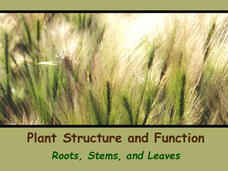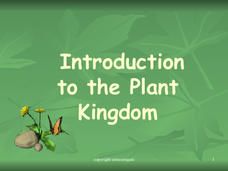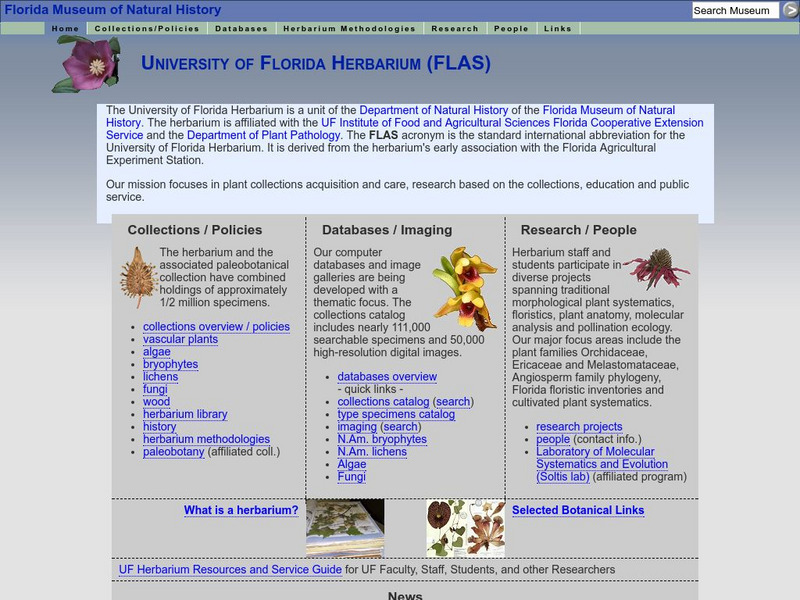Science 4 Inquiry
Plant Structures Lab Stations
In China, hibiscus is known as the shoe flower because it is used to polish shoes, while in Hawaii, it is honored as the state flower. Young scientists learn about the structure and function of flowers. They dissect hibiscus flowers,...
K-State Research and Extensions
You Ol’ Fossil
Geologists are gneiss, tuff, and a little bit wacke. The fifth chapter of seven includes ten activities at four different levels. The hands-on activities cover fossils including how they are formed, vertebrates, invertebrates,...
Scholastic
Study Jams! Mosses and Ferns
Mosses and ferns are some of the world's oldest types of plants. Here is a quality 10-slide presentation set to gentle background music for beginning botanists to view and enjoy. Accompanying captions explain that these are both...
Biology Junction
Plant Structure and Function: Roots, Stems, and Leaves
Scientists found fossils of plants more than 420 million years old—but plants existed for up to 100 million years prior to these fossils. Learn about the importance of plants to the entire planet. Viewing a presentation helps scholars...
Biology Junction
Plant Diversity
Ginkgo trees existed for more than 350 million years, and, at this time, only one species still remains. While plant diversity generally increases over geologic time, some interesting exceptions occur. Young scientists learn about plant...
Biology Junction
Introduction to the Plant Kingdom
Plants provide humans with food, shelter, and medications. Scholars gain a better appreciation for plants after learning their functions, divisions, and early ancestors. Each sub-topic includes slides highlighting vocabulary and...
Biology Junction
Nonvascular and Simple Vascular Plants: Mosses to Ferns
Sometimes conservationists use specific plants to prevent erosion or fight invasive species. A 50-slide presentation covers both nonvascular and vascular plants. It discusses the plants, their stages and life cycles, reproduction, uses,...
American Farm Bureau Foundation for Agriculture
My Miniature Greenhouse!
Here is an activity that will peak your super scientists' interest and knowledge of greenhouse gardening. Green thumbs flourish when they build, prepare, take care of, and observe their seedlings inside a miniature greenhouse. With...
Biology Junction
Seed Plants: Gymnosperms and Angiosperms
One of the reasons plants found success on land relates to seed development. Scholars learn about many different forms of seeds and how they changed over time. It describes the structure and function of many different types of seeds in...
Curated OER
Reviving Celery
The classic in-class demonstration using celery dipped into water with food coloring is the highlight of this biology lesson plan. Young scientists discover that organisms are made up cells and have distinguishing characteristics. After...
Curated OER
Survey of the Plant Kingdom
In this plant kingdom worksheet, students will review the characteristics of the 12 divisions of the plant kingdom, comparing and contrasting their structures and life cycles. This worksheet has 17 matching, 5 short answer, and 5 fill in...
Curated OER
Seedless Plants
In this plant worksheet, students complete 1 short answer question and 6 fill in the blank statements using a word bank about seedless plants.
Curated OER
Characteristics of Plants
For this characteristics of plants worksheet, students name two things that all plants have in common. Then they describe how the cell walls and cuticles help plants adapt to life on land. Students also explain the difference between...
Curated OER
Investigation Xylem
Students investigate how water travels up the stem of vascular plants by using food coloring to stain the xylem of a number of different plants. They know the function of leaves, stems, and root at the end of the experiment.
Curated OER
Plants: Form and Function
In this plants worksheet, students compare and contrast vascular and non-vascular plants. Students learn the structure and function of the 3 types of plant tissues: dermal, ground, and vascular tissue. This worksheet has 27 fill in the...
Curated OER
How Are Plants Classified?
In this plant classification worksheet, students compare and contrast the two groups of plants: vascular and nonvascular plants. This worksheet is a graphic organizer.
Curated OER
How Do Plants Move Materials?
In this plant worksheet, students will write 1 main idea on how plants move materials. Then students will write in 3 details about how nonvascular and vascular plants moves materials including the upward flow of water. This worksheet is...
PBS
Pbs Learning Media: Duckweed
These images of duckweed (Lemna spp.) illustrate the basic anatomy and environment of these fast-growing plants.
University of Florida
Fmnh: University of Florida Herbarium
This excellent site contains information on the University of Florida Herbarium located in Gainsville, Florida. The Herbarium offers five different collections of plants as well as an electronic library of plants.
Estrella Mountain Community College
Maricopa Community College: Nonvascular Plants and Nonseed Vascular Plants
Very detailed outline describing several aspects of plant diversity, including vascular vs. nonvascular, evolutionary adaptations, homosporous and heterosporous life cycles, and specific information on some ancient species (Lycophytes,...
Ohio State University
General Plant Biology: Seedless Vascular Plants
Use this very concise summary except to become familiar with these examples of less complex plants. Some of the terminology is at a more advanced level.
Other
Cartage.org: Nonvascular Plants and Nonseed Vascular Plants
This detailed resource focuses on tracheophytes, psilophytes pslophytes, lycophytes, equisetophytes, and ferns. Charts, drawings, and pictures supplement the text.
Other
Ny Botanical Garden: Fungal and Plant Diversity
Findings of an expedition by the New York Botanical Garden in French Guiana to investigate vegetation.
Smithsonian Institution
National Museum of Natural History: Paleobiology: The Silurian Period
Journey into the past while reading this comprehensive overview of the Silurian Period that covers topics such as life in the seas, invasion of land, fossil evidence, and climate and geology.





















